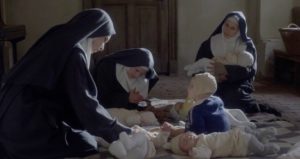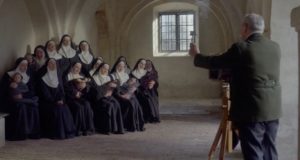The Innocents (French title Agnus Dei). 2016. Directed by Anne Fontaine. Written by Peter Bonitzer and Anne Fontaine. Starring Agata Buzek, Lou de Laâge, and Vincent Macaigne. 115 Mins. Rated PG-13.
In Poland during the last days of WW II a young French physician-in-training (Lou de Laâge) finds herself in a very difficult, and wholly unimaginable predicament. Attached to a Red Cross unit tending to injured French soldiers, and unbeknownst to anyone else, she undertakes an emergency Cesarean birth for, surprise, a pregnant nun in a local Benedictine convent. And that is just the beginning, for there are many more nuns with child. The circumstance results, as the doctor eventually discovers, from the occupation of the small convent nine months before by a Russian platoon that repeatedly raped its inhabitants, young and old alike. And no, this scenario is not the product of a demented Hollywood screenwriter but rests on an historical incident unearthed by the nephew of physician Madeleine Pauliac (who died not long after in an auto accident).
Appropriately, the film is set in the gray sunless cold and snow of an arduous Polish winter when hunger and orphans fill the war-torn countryside.

Cinematographer Caroline Champetier, who also shot the remarkable Of Gods and Men (2010), renders the world at once stark and luminous, dampening the palette to delicate variations of gray upon which light seems to float, much as in a Vermeer painting. The same ambiguities caught in the cinematography seem to afflict the nuns personally, given their dire circumstances, and they individually respond in quite different ways, from the rigid old-style Abbess who wants to keep this “scandal” from authorities Polish and churchly to young nuns who find in this event a good reason to take leave of the monastic life. And all the while the young doctor, raised by hard-core Marxist atheists, finds herself somehow implicated in the fate of nuns and an increasingly large nursery full of babies.
Crisis arrives when it is time for the Red Cross unit to move on and the nuns have an unexplainable nursery full of infants. And there, suddenly, comes clear an amply surprising route to as happy an ending as circumstances could permit, and in it, indeed, lies a fetching image of the kingdom of God so yearned for by Isaiah and Jesus and ordinary humans ever after.

The notion is that the reclusive convent can sidestep infamy if they become, remarkably, an orphanage not only for the infants but for the large number of the area’s homeless orphans. And suddenly, by grace or whatever, all the exiled—babies, nuns, and kids—have one another and a home and a new kind of reality. And it is a sight to behold—not exactly Bethlehem but, to be sure, close in its picture of God’s holy family and, yes, kingdom come.
Maybe the film should end there, but there is a postscript of sorts. At Christmas one nun arranges for a photograph of this new reality and sends it to the now long-absent physician rescuer who looks at it ever so wistfully, for there, in the worst of circumstances and against all odds, the Kingdom of God has happened, or at least as much as it possibly can upon this ragged, tear-sodden earth. Unimaginably, out of dire darkness has come “love’s pure light” in ways plausible and exultant, for which we all yearn, as does that healer-pilgrim who carries with her always that photographic glimpse of quiet but exultant divine light.
written by Roy Anker

Sign Up for Our Newsletter!
Insights on preaching and sermon ideas, straight to your inbox. Delivered Weekly!
Categorized into Kingdom
The Innocents (2016)